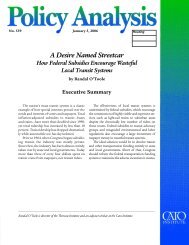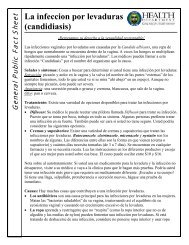Friend of the Court Handbook - Kent County, Michigan
Friend of the Court Handbook - Kent County, Michigan
Friend of the Court Handbook - Kent County, Michigan
Create successful ePaper yourself
Turn your PDF publications into a flip-book with our unique Google optimized e-Paper software.
HAKENT COUNTYFRIEND OF THE COURTNDBOOK17 TH JUDICIALCIRCUIT COURTJune 2010
Mission StatementTo assist <strong>the</strong> Family Division <strong>of</strong> <strong>the</strong> Circuit<strong>Court</strong> in facilitating <strong>the</strong> resolution <strong>of</strong>domestic relations matters so that children’sbest interests are protected.<strong>Kent</strong> <strong>County</strong> <strong>Friend</strong> <strong>of</strong> <strong>the</strong> <strong>Court</strong>Address:82 Ionia Avenue NW - Suite 200P.O. Box 351Grand Rapids, MI 49501-0351Main Telephone Number:(616) 632-6888Office Hours:8:00 a.m. to 5:00 p.m.Monday through FridayTelephone Hours:8:00 a.m. to 5:00 p.m.Monday through FridayPayment Window Hours:8:00 a.m. to 5:00 p.m.Monday through Friday<strong>Friend</strong> <strong>of</strong> <strong>the</strong> <strong>Court</strong> Orientation:Conducted on scheduled Mondays,10:00 a.m. and 5:30 p.m.<strong>Friend</strong> <strong>of</strong> <strong>the</strong> <strong>Court</strong> website addresswww.accesskent.com/foc
TABLE OF CONTENTSIntroduction _________________________________________________________________ 1Parties' Rights and Responsibilities _____________________________________________ 1<strong>Friend</strong> <strong>of</strong> <strong>the</strong> <strong>Court</strong> Duties _____________________________________________________ 2<strong>Court</strong> Procedures ____________________________________________________________ 4Hearings ____________________________________________________________________ 4<strong>Court</strong> Orders ________________________________________________________________ 5Alternative Dispute Resolution _________________________________________________ 7Information about Custody, Parenting-Time, and Support Payments _________________ 8Custody __________________________________________________________________ 8Custody Questions and Answers ______________________________________________ 9Parenting-Time ___________________________________________________________ 11Parenting-Time Questions and Answers ______________________________________ 12Support _________________________________________________________________ 14Child Support Questions and Answers ________________________________________ 19Miscellaneous Questions & Answers ____________________________________________ 20Change <strong>of</strong> Domicile/Change <strong>of</strong> Legal Residence ________________________________ 20Enforcement <strong>of</strong> Judge's Oral Ruling _________________________________________ 21Property Settlement _______________________________________________________ 21Access to <strong>Friend</strong> <strong>of</strong> <strong>the</strong> <strong>Court</strong> Records ________________________________________ 21Access to O<strong>the</strong>r Records ____________________________________________________ 21Adoptions, Marriages, and Military Enlistments; How They Affect Child Support ___ 21Parent Locator____________________________________________________________ 22Complaints About Attorneys, Judges, or <strong>the</strong> FOC ________________________________ 22O<strong>the</strong>r Local Human Services Agencies __________________________________________ 24Glossary <strong>of</strong> Frequently Used Terms ____________________________________________ 24
IntroductionThis handbook summarizes <strong>the</strong> duties and procedures <strong>of</strong> <strong>the</strong> friend <strong>of</strong> <strong>the</strong> court (FOC), providesinformation about parties’ rights and responsibilities, and describes some basic court procedures.The family division <strong>of</strong> <strong>the</strong> circuit court decides divorce, paternity, custody, and support matters.The FOC is part <strong>of</strong> <strong>the</strong> circuit court and is supervised by <strong>the</strong> chief judge. The FOC helps <strong>the</strong>court administer on those types <strong>of</strong> cases.Parents can make family disputes less stressful for <strong>the</strong>ir children by maintaining <strong>the</strong>ir children’sregular routines, encouraging frequent contact between <strong>the</strong> children and both parents, supporting<strong>the</strong> o<strong>the</strong>r parent’s involvement in <strong>the</strong> children’s schooling and o<strong>the</strong>r activities, and exchanginginformation about <strong>the</strong> children. Children want both parents to be part <strong>of</strong> <strong>the</strong>ir lives, to attend<strong>the</strong>ir graduations and weddings, to celebrate <strong>the</strong> births <strong>of</strong> <strong>the</strong>ir children, and to be part <strong>of</strong> o<strong>the</strong>rmajor life events.Parties’ Rights and ResponsibilitiesEach Party Has <strong>the</strong> Right To:Meet with <strong>the</strong> FOC employee who is investigating custody or parenting time.Ask <strong>the</strong> FOC to recommend that an order for support or health insurance be modified.See <strong>the</strong> section entitled, Party’s Motion to Modify <strong>the</strong> Support Order.Expect <strong>the</strong> FOC <strong>of</strong>fice to perform its duties under <strong>Michigan</strong> law and court rules.File a grievance concerning an FOC employee or an FOC <strong>of</strong>fice procedure.Hire and consult an attorney.If <strong>the</strong> parties agree and <strong>the</strong> court approves, decline all FOC assistance (“opt-out”).Each Party Has <strong>the</strong> Responsibility To:Provide <strong>the</strong> following information in writing to every FOC <strong>of</strong>fice that is administering acase involving that party, and provide updates to this information as it changes:o A current residential address.o A single, current mailing address where all notices and papers should be sent.o Current employer’s (or o<strong>the</strong>r source <strong>of</strong> income) name, address, and telephonenumber.o Current telephone number (residential or mobile).o Occupational or driver’s licenses held, and license number(s).1
o Social security number, unless exempt by law from disclosing that number.o Current address <strong>of</strong> children.o Current information regarding health care coverage that is available to ei<strong>the</strong>r partyas a benefit <strong>of</strong> employment, or that ei<strong>the</strong>r party purchases directly from an insurer.Provide o<strong>the</strong>r information required by law to help <strong>the</strong> FOC carry out its duties.Obey all court orders.<strong>Friend</strong> <strong>of</strong> <strong>the</strong> <strong>Court</strong> DutiesThe <strong>Michigan</strong> Legislature created <strong>the</strong> FOC system in 1919. At least one FOC <strong>of</strong>fice serves eachcircuit court’s family division. The FOC performs <strong>the</strong> following duties:When directed by <strong>the</strong> judge, it investigates and makes recommendations to <strong>the</strong> courtregarding:o Custody;o Parenting time;o Child support, medical support, and sometimes spousal support.It <strong>of</strong>fers voluntary alternative dispute resolution (ADR) services to help settledisagreements about custody or parenting time.In cooperation with <strong>the</strong> <strong>Michigan</strong> State Disbursement Unit (MiSDU), it collects, records,and distributes support payments as ordered by <strong>the</strong> court.It helps <strong>the</strong> court enforce orders <strong>of</strong> custody, parenting time, and support.It informs <strong>the</strong> parties that <strong>the</strong>y may decline FOC services.It makes available forms that parties may use to file motions and responses regardingcustody, parenting time, support, change <strong>of</strong> domicile, and repayment plans.It informs <strong>the</strong> parties <strong>of</strong> <strong>the</strong> availability <strong>of</strong> joint custody.The FOC has no authority to:Investigate abuse and neglect.Change an order.Investigate criminal activity.Give legal advice to ei<strong>the</strong>r party.2
Toge<strong>the</strong>r with <strong>the</strong> Office <strong>of</strong> Child Support (OCS), local FOC <strong>of</strong>fices administer all aspects <strong>of</strong><strong>Michigan</strong>’s child support program. OCS is part <strong>of</strong> <strong>the</strong> <strong>Michigan</strong> Department <strong>of</strong> Human Services(DHS). OCS administers <strong>the</strong> child support requirements <strong>of</strong> <strong>the</strong> federal Social Security Act,oversees <strong>the</strong> MiSDU, and oversees <strong>Michigan</strong>’s child support computer system.This handbook describes <strong>the</strong> general duties <strong>of</strong> <strong>the</strong> FOC. Some specific procedures vary by county.You may discuss any questions regarding local or statewide procedures or requirements with yourlocal FOC <strong>of</strong>fice or with your attorney.To become familiar with some family law and FOC legal terms, please refer to <strong>the</strong> glossary at <strong>the</strong>end <strong>of</strong> this handbook.Opting Out <strong>of</strong> All Services Offered by <strong>the</strong> FOCParties who agree that <strong>the</strong>y do not need <strong>the</strong> FOC’s services do not have to use <strong>the</strong>m, unlesscertain circumstances apply. They may file a joint motion to opt-out and, if <strong>the</strong> court approves it,<strong>the</strong> parties <strong>the</strong>n must deal with each o<strong>the</strong>r directly. Before <strong>the</strong> court approves a motion to optout,<strong>the</strong> parties must file a document that summarizes FOC services and acknowledges that <strong>the</strong>parties have chosen not to use those services.If an opt-out motion is filed at <strong>the</strong> same time as <strong>the</strong> complaint that starts <strong>the</strong> case, <strong>the</strong> court mustorder <strong>the</strong> FOC not to open a case file unless one or more <strong>of</strong> <strong>the</strong> following are true:A party is eligible for “Title IV-D services,” because <strong>the</strong> party receives or has received in<strong>the</strong> past “public assistance.” Please see <strong>the</strong> glossary for definitions.A party has applied for IV-D services.A party has asked <strong>the</strong> FOC to open a case file.There is evidence <strong>of</strong> domestic violence or bargaining inequality, and evidence that <strong>the</strong>opt-out request is against <strong>the</strong> best interests <strong>of</strong> a party or <strong>the</strong> child.After a court case has been started and <strong>the</strong> FOC has opened a file for that case, <strong>the</strong> parties may file anopt-out motion requesting <strong>the</strong> court to order <strong>the</strong> FOC to close its file. The court will issue <strong>the</strong> orderunless one or more <strong>of</strong> <strong>the</strong> following are true:A party objects to <strong>the</strong> closure.A party is receiving public assistance.Within <strong>the</strong> past 12 months, a support arrearage has existed, a custody or parenting-timeviolation has occurred, or a party has asked <strong>the</strong> FOC to reopen its case file.There is evidence <strong>of</strong> domestic violence or bargaining inequality coupled with evidencethat <strong>the</strong> request is against <strong>the</strong> best interests <strong>of</strong> a party or <strong>the</strong> child.Parties who opt-out are responsible for administering and enforcing <strong>the</strong> court’s orders. To assurea proper accounting <strong>of</strong> support payments and <strong>the</strong>ir consideration in future proceedings, <strong>the</strong>3
parties may make support payments through <strong>the</strong> MiSDU even after an FOC case file is closed.At any time, if a party applies for public assistance, requests any service from <strong>the</strong> FOC, orrequests that <strong>the</strong> FOC reopen a case, <strong>the</strong> FOC must reopen <strong>the</strong> case file. In such situations, <strong>the</strong>court may request that a party, or <strong>the</strong> FOC, prepare a written order to reopen <strong>the</strong> case.<strong>Court</strong> ProceduresStarting a CaseNo court can require a party to use an attorney. Anyone, including a party acting without anattorney, who wants to start a court case, must follow <strong>Michigan</strong> <strong>Court</strong> Rules and <strong>Michigan</strong> law.Because domestic relations cases <strong>of</strong>ten involve difficult legal and factual questions, most peoplewill want to be represented by an attorney.Plaintiff’s ComplaintA case begins when <strong>the</strong> person requesting <strong>the</strong> court’s assistance (<strong>the</strong> plaintiff) files a “complaint”that asks <strong>the</strong> court to decide a dispute between <strong>the</strong> plaintiff and <strong>the</strong> o<strong>the</strong>r party (<strong>the</strong> defendant).In a domestic relations case, <strong>the</strong> plaintiff may ask <strong>the</strong> court to do any <strong>of</strong> <strong>the</strong> following:ServiceGrant a divorce.Order a person to pay child support (including medical support) or spousal support.Establish paternity.Establish custody <strong>of</strong> a child with one (or both) parties.Establish each party’s parenting time with a child.The plaintiff must arrange for <strong>the</strong> defendant to be served with a summons and a copy <strong>of</strong> <strong>the</strong>complaint. The summons tells <strong>the</strong> defendant to answer <strong>the</strong> complaint. Whenever minor childrenare involved or spousal support is requested, an informational handbook (this handbook or onelike it) must also be given to <strong>the</strong> defendant.Defendant’s Answer to <strong>the</strong> ComplaintThe defendant is allowed 21 days to answer <strong>the</strong> complaint. If <strong>the</strong> defendant does not answerwithin 21 days, <strong>the</strong> judge may enter an order granting <strong>the</strong> plaintiff’s requests.HearingsAfter a complaint and an answer have been filed, ei<strong>the</strong>r party may file a motion asking <strong>the</strong> courtto decide custody, parenting time, and child support issues. The FOC will <strong>of</strong>ten conduct anevaluation before <strong>the</strong> court makes a decision regarding custody, parenting time, or child support.4
The court usually holds a hearing to get whatever additional information it needs. At <strong>the</strong> hearing,<strong>the</strong> parties can tell <strong>the</strong> court what <strong>the</strong>y think it should do.<strong>Court</strong> OrdersWhen a court makes a decision, it must sign a written order summarizing <strong>the</strong> decision. Someonemust prepare <strong>the</strong> order; usually, one <strong>of</strong> <strong>the</strong> attorneys prepares <strong>the</strong> order, but sometimes a courtemployee prepares it. In cases where a party is unrepresented by an attorney (<strong>of</strong>ten called “in proper” or “pro se”), <strong>the</strong> court may require that a party prepare <strong>the</strong> order and present it to <strong>the</strong> court.No matter who prepares <strong>the</strong> order, it is not enforceable until a judge signs it and <strong>the</strong> signed orderis filed with <strong>the</strong> county clerk. A referee can only recommend an order and prepare it; <strong>the</strong>recommended order does not become enforceable until a judge signs it. If a party disagrees withan order and wants to challenge it, <strong>the</strong> party may file a motion for a rehearing (by <strong>the</strong> judge whoissued <strong>the</strong> order) or file an appeal (to a higher court). A party cannot change an order by filing agrievance or by complaining to o<strong>the</strong>r government agencies.Preliminary Order<strong>Court</strong>s sometimes enter temporary orders that remain in effect only until <strong>the</strong> parties have anopportunity to present more detailed evidence and arguments at a later hearing. This <strong>of</strong>tenhappens in divorce cases.Ex Parte Order (temporary orders entered at <strong>the</strong> request <strong>of</strong> one party before any formalhearing)An ex parte order is an order that is entered without first hearing from all <strong>the</strong> parties. A judgewill enter an ex parte order when <strong>the</strong> judge believes that serious harm will occur if <strong>the</strong> judgewaits to hear from both parties before issuing <strong>the</strong> order. Ex parte orders usually are intended tokeep <strong>the</strong> situation stable until <strong>the</strong> judge can hear from both parties. A party who disagrees withan ex parte order may file a written objection to <strong>the</strong> order or file a motion asking <strong>the</strong> court tochange or cancel <strong>the</strong> order, but <strong>the</strong> ex parte order will remain in effect until it is changed by <strong>the</strong>court.When an ex parte order deals with custody, parenting time, or child support, <strong>the</strong> order willinclude a notice that a written objection or a motion to change <strong>the</strong> order may be filed within 14days. If a party files an objection, <strong>the</strong> FOC will try to help <strong>the</strong> parties settle <strong>the</strong> dispute withoutgoing to court. If <strong>the</strong> parties cannot agree, <strong>the</strong> FOC will provide <strong>the</strong> forms and instructions that aparty who is not represented by an attorney will need to schedule a court hearing.Instructions on challenging an ex parte order are available at:http://courts.michigan.gov/scao/courtforms/domesticrelations/focgeneral/p05.pdfTemporary and Final OrdersAfter a court decides a motion challenging an ex parte order, <strong>the</strong> court will enter a temporaryorder with instructions that <strong>the</strong> parties must follow until a final judgment order (or a modifiedtemporary order) is entered.5
Orders (including judgment orders that deal with custody, parenting time, and child support) canbe changed, but only a court can change an order; <strong>the</strong> FOC cannot. Normally, a court willchange an order if both parties have agreed to <strong>the</strong> change. O<strong>the</strong>rwise, a court will change anorder only after one party (or <strong>the</strong> FOC) files a motion and <strong>the</strong> court holds a hearing on <strong>the</strong>motion.Even if <strong>the</strong> parties agree to change a previous court order, <strong>the</strong> court and <strong>the</strong> FOC cannot follow<strong>the</strong> new agreement until <strong>the</strong> judge signs and enters a new order that approves <strong>the</strong> agreement.Sometimes, <strong>the</strong> law requires <strong>the</strong> FOC to ask <strong>the</strong> court to change an order. (See Parenting TimeEnforcement and Modification <strong>of</strong> a Child Support Order later in this handbook).Referee DecisionsA referee is not a judge, but performs some tasks on behalf <strong>of</strong> <strong>the</strong> judge who is presiding over <strong>the</strong>case. A referee may hold hearings, examine witnesses, and make recommendations to a judge.The chief judge <strong>of</strong> a circuit court may appoint a referee to hear testimony and arguments on anyissue in a domestic relations case except spousal support (alimony). Only a judge may heartestimony and arguments on spousal support.A referee’s decision is only a recommendation to <strong>the</strong> judge. A referee’s recommendation willbecome a court order only if nei<strong>the</strong>r party files an objection within specific time limits, or (if aparty does object) only after <strong>the</strong> court holds a hearing and <strong>the</strong> judge <strong>the</strong>n signs an orderapproving <strong>the</strong> referee’s recommendation. The court may make <strong>the</strong> referee’s recommended ordereffective temporarily until ei<strong>the</strong>r <strong>the</strong> time to object to <strong>the</strong> recommended order expires or <strong>the</strong>judge hears an objection at a de novo, or new, hearing.A party who disagrees with a referee’s recommendation may request a de novo hearing before <strong>the</strong>judge. The objection and a request for a hearing must be in writing and must be filed with <strong>the</strong>circuit court clerk within 21 days after <strong>the</strong> referee’s recommendation is mailed or delivered.Consult an attorney for more information on how to object to a referee’s recommendation andhow to request a hearing before a judge. Some FOC <strong>of</strong>fices will provide written instructions thatexplain how to file an objection.Reconciliations and DismissalsNot every domestic relations case ends with <strong>the</strong> parties divorced or separated. If <strong>the</strong> parties aretrying to work out <strong>the</strong>ir differences and no longer wish to have an order in <strong>the</strong>ir case enforced,<strong>the</strong>y may file a motion asking <strong>the</strong> court not to enforce <strong>the</strong> order.If <strong>the</strong> parties wish to stop all fur<strong>the</strong>r action in a case, <strong>the</strong>y must file a proposed order <strong>of</strong> dismissalwith <strong>the</strong> court and provide a copy to <strong>the</strong> FOC. In that situation, when <strong>the</strong> state <strong>of</strong> <strong>Michigan</strong> hasprovided financial assistance to <strong>the</strong> parties’ children or spouse while <strong>the</strong> case was pending, <strong>the</strong>support payer must reimburse any previously ordered child or spousal support to <strong>the</strong> state <strong>of</strong><strong>Michigan</strong>. This reimbursement amount may be less than <strong>the</strong> amount <strong>of</strong> assistance, but it cannotbe more. Before <strong>the</strong> case may be dismissed, <strong>the</strong> support payer must pay any amounts owed to <strong>the</strong>6
court or <strong>the</strong> county. If those requirements are met, <strong>the</strong> court will sign an order dismissing <strong>the</strong>case.Enforcing Orders When One Parent Leaves <strong>Michigan</strong>The obligation to pay child support does not end when a party leaves <strong>Michigan</strong>. Both parentsmust tell <strong>the</strong> FOC whenever <strong>the</strong>y move. The support payer must continue to pay support and <strong>the</strong>friend <strong>of</strong> <strong>the</strong> court must continue to enforce <strong>the</strong> court order.If a support payer leaves <strong>Michigan</strong> and stops paying as ordered, <strong>the</strong>re are laws that allow<strong>Michigan</strong> courts to have <strong>the</strong>ir support orders enforced in o<strong>the</strong>r states. For example, every statehas passed a law that allows a court in ano<strong>the</strong>r state to withhold <strong>the</strong> payer’s income, enforce <strong>the</strong>order, set or modify a support order, or assist with finding <strong>the</strong> payer’s assets. For moreinformation, see The Uniform Interstate Family Support Act (UIFSA) (PSA 29) located at:http://www.courts.mi.gov/scao/resources/publications/pamphlets/focb/psa29.pdfAlternative Dispute Resolution (ADR)Parties involved in a domestic relations case are encouraged to participate in ADR, which mayallow <strong>the</strong>m to settle a case without fur<strong>the</strong>r court proceedings. In addition to parents, ADR maysometimes involve grandparents and o<strong>the</strong>r third parties.ADR allows <strong>the</strong> parties to settle <strong>the</strong> issues without <strong>the</strong> court’s direct involvement. Parties <strong>of</strong>tenfind this rewarding because <strong>the</strong>y make <strong>the</strong> decisions, instead <strong>of</strong> <strong>the</strong> court. The court must stillenter an order, but <strong>the</strong> court order will usually reflect <strong>the</strong> agreement reached by <strong>the</strong> parties. Thenext few sections summarize <strong>the</strong> kinds <strong>of</strong> ADR that might be available in domestic relationscases. You should check with your local FOC <strong>of</strong>fice to find out what types <strong>of</strong> ADR servicesmight be available.<strong>Friend</strong> <strong>of</strong> <strong>the</strong> <strong>Court</strong> Formal Domestic Relations MediationThe FOC <strong>of</strong>fers formal mediation services to help parents resolve custody and parenting-timedisputes, which are <strong>the</strong> only two issues that <strong>the</strong> FOC is allowed to mediate.FOC mediation is voluntary, meaning that both parties must be willing to participate. If <strong>the</strong>parties reach an agreement during mediation, <strong>the</strong> mediator can put it into writing. The partiesmay review this agreement with <strong>the</strong>ir attorneys. The agreement can be made part <strong>of</strong> a courtorder.Matters discussed during mediation are confidential. An FOC employee who acts as a mediatormay not share information about what happened during mediation, except for what is stated in<strong>the</strong> parties’ signed agreement. The mediator cannot later, in <strong>the</strong> same case, enforce an order,investigate an allegation, or serve as a referee regarding any o<strong>the</strong>r issues in that case.<strong>Court</strong> Rule Domestic Relations MediationThe court may refer family matters to nonbinding mediation under <strong>the</strong> <strong>Michigan</strong> <strong>Court</strong> Rules,specifically MCR 3.216. This may happen by agreement <strong>of</strong> <strong>the</strong> parties, on <strong>the</strong> motion <strong>of</strong> one7
party granted by <strong>the</strong> judge, or on <strong>the</strong> court’s own initiative.Unlike <strong>the</strong> FOC mediation summarized above, court rule mediation is not necessarily voluntaryand is not limited to only custody or parenting-time issues. The court may order mediation forany disputed issue. The parties may agree to have <strong>the</strong> case mediated by any person who has <strong>the</strong>qualifications specified in <strong>the</strong> court rule. If <strong>the</strong> parties cannot agree on a mediator, <strong>the</strong> court’sADR clerk will assign one from a list <strong>of</strong> qualified mediators. The person who performs courtrule mediation is entitled to a reasonable fee. The parties usually share that expense equally.If ordered by <strong>the</strong> court, court rule mediation is mandatory. The parties must attend <strong>the</strong> mediationsessions. They may be accompanied by <strong>the</strong>ir attorneys. Any information shared with <strong>the</strong>mediator is considered confidential. The mediator may not disclose this information to anyone.If <strong>the</strong> parties reach agreement during mediation, <strong>the</strong> agreement must be put in writing and besigned by <strong>the</strong> parties. The parties must <strong>the</strong>n take <strong>the</strong> necessary steps to have <strong>the</strong> mediationagreement entered as a court order.If <strong>the</strong> parties do not reach agreement, <strong>the</strong> mediator may prepare a report to <strong>the</strong> parties settingforth <strong>the</strong> mediator’s own recommendations on <strong>the</strong> issues. If both parties accept <strong>the</strong> mediator’srecommendations, <strong>the</strong> parties must <strong>the</strong>n take <strong>the</strong> necessary steps to have <strong>the</strong> recommendationsentered as a court order. If ei<strong>the</strong>r party rejects <strong>the</strong> mediator’s recommendation, even in part, <strong>the</strong>nall issues in <strong>the</strong> case must go to trial. The judge who conducts <strong>the</strong> trial will not know what <strong>the</strong>mediator recommended or which party rejected <strong>the</strong> mediator’s recommendation.ConciliationConciliation is a process in which an FOC employee assists <strong>the</strong> parties in reaching agreementabout custody and/or parenting-time arrangements. In <strong>the</strong> absence <strong>of</strong> agreement, <strong>the</strong> FOCemployee may prepare a recommendation for a custody or parenting-time court order.Information about <strong>the</strong> case ga<strong>the</strong>red during conciliation may be used by <strong>the</strong> court later in o<strong>the</strong>rproceedings.Joint MeetingThe <strong>Friend</strong> <strong>of</strong> <strong>the</strong> <strong>Court</strong> Act allows <strong>the</strong> FOC to use joint meetings to assist parties in resolvingcustody and parenting-time disputes and support recommendations. Joint meetings are similar toconciliation. The difference is that conciliation is used before <strong>the</strong> first order has been entered;joint meetings are used to resolve disputes after an order has been entered.Information about Custody, Parenting Time, and Support PaymentsCustodyThere are many different kinds <strong>of</strong> custody arrangements. For any arrangement, <strong>the</strong> court mustdecide who will make <strong>the</strong> major decisions about each child. The court also must decide howmuch time <strong>the</strong> child will spend with each parent.Parents are encouraged to reach <strong>the</strong>ir own agreements regarding custody. When parents cannot8
agree, <strong>the</strong> judge will decide by analyzing <strong>the</strong> “best interests <strong>of</strong> <strong>the</strong> child” factors listed in <strong>the</strong><strong>Michigan</strong> Child Custody Act. Those factors will be analyzed at a hearing, during which <strong>the</strong>parents may present evidence and arguments about each factor.At ei<strong>the</strong>r parent’s request, <strong>the</strong> court must consider ordering “joint custody,” an arrangement inwhich both parents participate in making <strong>the</strong> major decisions that affect <strong>the</strong>ir child. If bothparents agree to a joint custody arrangement, <strong>the</strong> court must order it unless <strong>the</strong> court determinesthat joint custody is not in <strong>the</strong> “best interests <strong>of</strong> <strong>the</strong> child.” The court must state its reasons forgranting or denying <strong>the</strong> request for joint custody. The court may also consider ordering jointcustody even if nei<strong>the</strong>r parent has requested it. A judge who is considering ordering jointcustody must consider both <strong>the</strong> “best interests” factors and also whe<strong>the</strong>r <strong>the</strong> parents will be ableto cooperate and usually agree on important decisions affecting <strong>the</strong>ir child’s welfare.If <strong>the</strong> court determines that a child’s interests are not adequately represented in <strong>the</strong> custodyproceedings, <strong>the</strong> court may appoint a lawyer guardian ad litem to represent <strong>the</strong> child. The courtmay require <strong>the</strong> parties to pay <strong>the</strong> lawyer guardian ad litem’s fees.For more information about child custody issues, see <strong>Michigan</strong> Custody Guidelines at:http://courts.michigan.gov/scao/resources/publications/manuals/focb/custodyguideline.pdfCustody Questions and AnswersCan a custody order be changed if both parents agree?Both parents may sign an agreement and present an order to <strong>the</strong> court. If <strong>the</strong> judge approves andsigns <strong>the</strong> order, it will <strong>the</strong>n become <strong>the</strong> new custody order.Do I need an attorney to file a motion to change custody?No. You may file <strong>the</strong> motion on your own, and <strong>the</strong> FOC will provide <strong>the</strong> forms and instructionsthat you will need. The court will expect you to follow <strong>the</strong> same rules that an attorney mustfollow. There are many complex issues in a custody case and most people prefer to have anattorney represent <strong>the</strong>m. The FOC cannot file a motion for you, nor can that <strong>of</strong>fice provide youwith an attorney or tell you what to say in <strong>the</strong> motion.If a motion for custody has been filed, and <strong>the</strong> parents cannot reach an agreement on <strong>the</strong>ir own,what will <strong>the</strong> friend <strong>of</strong> <strong>the</strong> court do?The FOC must:Offer ADR services to <strong>the</strong> parties, depending on which types <strong>of</strong> services are available inthat FOC <strong>of</strong>fice.If <strong>the</strong>re has been a change in circumstances and <strong>the</strong> judge directs, investigate <strong>the</strong> custodyissues and file a written report and recommendation based upon <strong>the</strong> “best interests <strong>of</strong> <strong>the</strong>child” factors listed in <strong>the</strong> <strong>Michigan</strong> Child Custody Act. Parties should work to resolve<strong>the</strong>ir issues before filing a motion.9
May I receive a copy <strong>of</strong> <strong>the</strong> FOC’s custody report and recommendation?Yes. Upon request, and before <strong>the</strong> court acts on <strong>the</strong> recommendation, <strong>the</strong> FOC must give eachparty or that party’s attorney a copy <strong>of</strong> <strong>the</strong> report, including <strong>the</strong> custody recommendation and asummary <strong>of</strong> <strong>the</strong> information used in making <strong>the</strong> recommendation.Is <strong>the</strong>re a cost for <strong>the</strong> custody investigation?There could be a cost to <strong>the</strong> parties if <strong>the</strong> parties request <strong>the</strong> investigation.What happens if I have custody according to <strong>the</strong> court’s order, but <strong>the</strong> o<strong>the</strong>r parent does notreturn <strong>the</strong> child to me as required by <strong>the</strong> order?You may contact <strong>the</strong> FOC <strong>of</strong>fice and request that it initiate enforcement.You may file a motion, with or without an attorney, and ask <strong>the</strong> court to enforce <strong>the</strong> order.If you believe <strong>the</strong> o<strong>the</strong>r parent will refuse to return <strong>the</strong> child, you may contact <strong>the</strong> policeor <strong>the</strong> prosecuting attorney and ask ei<strong>the</strong>r to file a parental kidnapping charge.How do I enforce <strong>the</strong> custody order if <strong>the</strong> o<strong>the</strong>r parent takes our child to ano<strong>the</strong>r country?When a child who is a United States citizen is illegally kept outside <strong>of</strong> this country, <strong>the</strong> UnitedStates State Department’s Office <strong>of</strong> Children’s Issues will work with <strong>the</strong> local U.S. embassy and<strong>the</strong> o<strong>the</strong>r country’s government to assist <strong>the</strong> child and <strong>the</strong> lawful custodial parent. However,because child custody disputes are private legal disputes between <strong>the</strong> two parents, <strong>the</strong> StateDepartment has no jurisdiction to force <strong>the</strong> o<strong>the</strong>r parent to obey a court order. If <strong>the</strong> parentscannot reach an agreement, this kind <strong>of</strong> child custody dispute <strong>of</strong>ten must be resolved by judicialproceedings in <strong>the</strong> country where <strong>the</strong> child and <strong>the</strong> o<strong>the</strong>r parent are living. The State Departmentwill help <strong>the</strong> lawful custodial parent file <strong>the</strong> appropriate documents with <strong>the</strong> foreign authorities.It also will monitor and report on <strong>the</strong> foreign judicial or administrative proceedings.A parent may contact <strong>the</strong> Office <strong>of</strong> Children’s Issues at <strong>the</strong> United States Department <strong>of</strong> State, inwriting, at <strong>the</strong> following address: Department <strong>of</strong> State, Office <strong>of</strong> Children’s Issues, SA-29, 2201C Street, NW; U.S. Department <strong>of</strong> State, Washington, DC 20520-2818.The Office <strong>of</strong> Children’s Issues can be reached by phone at 1-888-407-4747, by fax 202-736-9080, or at <strong>the</strong> state department’s website for foreign travel athttp://travel.state.gov/family/family_1732.htmlIs <strong>the</strong> FOC allowed to investigate child abuse or neglect?The FOC does not have authority to investigate abuse or neglect. Abuse or neglect should bereported to <strong>the</strong> Child Protective Services (CPS) division <strong>of</strong> <strong>the</strong> Department <strong>of</strong> Human Services(DHS) in <strong>the</strong> county where <strong>the</strong> children live.A judge may consider allegations <strong>of</strong> abuse or neglect when making a decision regarding custodyor parenting time. A party should inform <strong>the</strong> FOC <strong>of</strong> any concerns about abuse or neglect if <strong>the</strong>FOC is doing a custody or parenting-time investigation. Both <strong>the</strong> judge and <strong>the</strong> FOC will rely on10
Child Protective Services to investigate and evaluate <strong>the</strong> abuse or neglect allegations.May my child enroll in my local school, even though <strong>the</strong> child lives in ano<strong>the</strong>r school districtwith <strong>the</strong> o<strong>the</strong>r parent most <strong>of</strong> <strong>the</strong> time?When <strong>the</strong> parents live in different school districts, <strong>Michigan</strong> law allows a child to attend a schoolin ei<strong>the</strong>r district, regardless <strong>of</strong> which parent has custody.Parenting-TimeA parenting-time order specifies when a child will spend time with each parent. A parent isresponsible for all routine decisions that affect <strong>the</strong> child during his or her parenting time. The<strong>Michigan</strong> Child Custody Act states:Parenting time shall be granted to a parent in a frequency, duration, and typereasonably calculated to promote a strong relationship between <strong>the</strong> child and <strong>the</strong>parent granted parenting time. If <strong>the</strong> parents <strong>of</strong> a child agree on parenting timeterms, <strong>the</strong> court shall order <strong>the</strong> parenting time terms . . . [unless it is shown] that<strong>the</strong> parenting time terms are not in <strong>the</strong> best interests <strong>of</strong> <strong>the</strong> child. A child has aright to parenting time with a parent unless it is shown on <strong>the</strong> record by clear andconvincing evidence that it would endanger <strong>the</strong> child’s physical, mental, oremotional health. [MCL 722.27a(1)-(3).]The statute also lists factors that <strong>the</strong> judge may consider when determining <strong>the</strong> frequency,duration, and type <strong>of</strong> parenting time. (MCL 722.27a[6].)Sample Parenting-Time Guidelines are available on <strong>the</strong> <strong>Michigan</strong> Supreme <strong>Court</strong>’s website at:http://courts.michigan.gov/scao/resources/publications/manuals/focb/pt_gdlns.pdfSome courts may have o<strong>the</strong>r guidelines in use, instead <strong>of</strong> <strong>the</strong> state sample guidelines. You shouldcontact your local FOC <strong>of</strong>fice to find out whe<strong>the</strong>r it enforces county-specific guidelines. Some localcounties have guidelines that are posted at <strong>the</strong> following website. This list is not comprehensive –you should contact your local FOC <strong>of</strong>fice to find out about local guidelines:http://courts.michigan.gov/scao/services/focb/ParentingTime.htmIn some situations, issues and disagreements that arise regarding parenting time may be resolvedthrough ADR. You should contact your local FOC <strong>of</strong>fice to determine what services may beavailable, and whe<strong>the</strong>r <strong>the</strong>y are appropriate for <strong>the</strong> situation.Parenting-Time EnforcementThe FOC is required to enforce parenting-time orders. The FOC <strong>of</strong>fice usually startsenforcement action when it receives a written complaint stating specific facts that show aviolation <strong>of</strong> an order governing custody or parenting time. The FOC may decline to respond if(1) <strong>the</strong> alleged violation occurred more than 56 days before <strong>the</strong> complaint is made, (2) <strong>the</strong>complaining party has previously made two or more similar complaints that were found by <strong>the</strong>court to be unwarranted and <strong>the</strong> complaining party has failed to pay <strong>the</strong> costs assessed in those11
prior proceedings, or (3) <strong>the</strong> court order does not include an enforceable parenting-timeprovision.The FOC starts enforcement proceedings by sending a copy <strong>of</strong> <strong>the</strong> written complaint to <strong>the</strong> o<strong>the</strong>rparty within 14 days after <strong>the</strong> FOC <strong>of</strong>fice receives <strong>the</strong> complaint. If <strong>the</strong> FOC finds that <strong>the</strong>court’s order has been violated, <strong>the</strong> FOC has <strong>the</strong> following options:Suggest “makeup” parenting time.Start an action requiring <strong>the</strong> party to show cause why <strong>the</strong> court should not find <strong>the</strong> partyin contempt.File a motion to modify existing parenting-time provisions.Schedule mediation, depending on <strong>the</strong> type <strong>of</strong> ADR services available in your county.Schedule a joint meeting with <strong>the</strong> parties.Parenting-Time-Modification MotionsA party may file a motion to change <strong>the</strong> parenting-time order, if <strong>the</strong> party can show proper causeor a change in circumstances. The FOC <strong>of</strong>fice has printed forms and instructions for filing thistype <strong>of</strong> motion. Parties may want to hire an attorney to assist with <strong>the</strong> motion.If both parents agree to change <strong>the</strong> parenting-time arrangement, <strong>the</strong>y may sign an agreement tothat effect and ask <strong>the</strong> judge to modify <strong>the</strong> current order. Even though <strong>the</strong> parties have agreed toa change, <strong>the</strong> current order remains in effect until <strong>the</strong> judge signs a new order and it is filed with<strong>the</strong> court clerk.Parenting-Time Questions and AnswersMy order states I will have “reasonable” parenting time. What does this mean?An order that grants “reasonable” parenting time assumes that you and <strong>the</strong> o<strong>the</strong>r parent will agreeto a parenting-time schedule that is convenient to both <strong>of</strong> you and to <strong>the</strong> child.If you and <strong>the</strong> o<strong>the</strong>r parent cannot agree on a “reasonable parenting time” schedule, you may:Ask <strong>the</strong> o<strong>the</strong>r parent to agree to attend mediation with <strong>the</strong> FOC.Ask <strong>the</strong> FOC whe<strong>the</strong>r <strong>the</strong> order is specific enough to allow <strong>the</strong> <strong>of</strong>fice to <strong>of</strong>fer assistance.File a motion on your own or contact an attorney.I would like to change my order’s parenting-time schedule. What can I do?First, ask <strong>the</strong> o<strong>the</strong>r parent to agree to a change. If you agree, you should prepare an ordercontaining your agreement and provide pro<strong>of</strong> to <strong>the</strong> court that both <strong>of</strong> you agree to <strong>the</strong> order. Thejudge will typically sign an order that is based on <strong>the</strong> parents’ agreement. Remember that <strong>the</strong>12
agreement by itself is not enforceable; it must first be converted into a new court order.If no agreement is possible and you can show proper cause or a change in circumstances, youmay file a motion asking <strong>the</strong> court to order a new parenting-time schedule. You may file <strong>the</strong>motion on your own, or have an attorney file it for you.The o<strong>the</strong>r parent is not making <strong>the</strong> child-support payments required by our court order. Do Ihave to allow parenting time?Yes. You must continue to obey <strong>the</strong> order’s parenting-time provisions. Ask <strong>the</strong> FOC to enforce<strong>the</strong> child support provisions (see Enforcement Methods later in this document).The o<strong>the</strong>r parent is not sending or returning clothing or o<strong>the</strong>r personal items that our child usesduring parenting time. Can <strong>the</strong> FOC do something about that?The FOC can only enforce <strong>the</strong> court’s written orders. If your court order does not say anythingspecific about transferring clothing or o<strong>the</strong>r personal items, try to work it out with <strong>the</strong> o<strong>the</strong>rparent. If that is unsuccessful, you may file a motion requesting a new court order that willrequire that clothing or o<strong>the</strong>r personal items be transferred along with your child before and afterparenting time.The o<strong>the</strong>r parent is not obeying <strong>the</strong> parenting-time order. What can I do?File a written complaint with <strong>the</strong> FOC (see Parenting-Time Enforcement). Some counties have aspecific form to use when filing a parenting-time complaint. Please contact your local county t<strong>of</strong>ind out how to proceed.If I believe that <strong>the</strong> o<strong>the</strong>r parent is under <strong>the</strong> influence <strong>of</strong> alcohol or drugs, do I have to let <strong>the</strong>children go with that o<strong>the</strong>r parent for scheduled parenting time?That is your decision as a parent. If you violate <strong>the</strong> court order in such a situation, you may haveto explain your decision to <strong>the</strong> court at a “show cause” hearing held to decide whe<strong>the</strong>r you shouldbe held in contempt <strong>of</strong> court for disobeying <strong>the</strong> parenting-time order. The hearing will be youropportunity to explain why your decision was in <strong>the</strong> best interests <strong>of</strong> <strong>the</strong> children. If <strong>the</strong> judgeagrees, you will not be held in contempt or o<strong>the</strong>rwise punished.The o<strong>the</strong>r parent will not let me telephone my children. What can <strong>the</strong> FOC do?The FOC can only enforce <strong>the</strong> court’s orders. If your court order does not provide for telephonecalls, try to negotiate an agreement with <strong>the</strong> o<strong>the</strong>r parent. You can also contact your local FOC<strong>of</strong>fice for guidance on how to proceed. In addition, you may file a motion asking <strong>the</strong> court tomodify <strong>the</strong> order to require that you be allowed to call your children.I think that my child is being abused during parenting time that is spent with <strong>the</strong> o<strong>the</strong>r parent.What should I do?Report your concerns to <strong>the</strong> DHS’s CPS division in <strong>the</strong> county where <strong>the</strong> children live. The FOCdoes not have authority to investigate abuse or neglect allegations, nor can it remove childrenfrom <strong>the</strong> home <strong>of</strong> a person who commits or allows mistreatment; only CPS can do that. CPS can13
e reached at 1-800-942-4357 (statewide) or 1-800-716-2234 (Wayne <strong>County</strong>).My child does not want to spend time with <strong>the</strong> o<strong>the</strong>r parent. What can I do?Parents must obey court orders regardless <strong>of</strong> <strong>the</strong> child’s age and preferences. Each parent musttry to promote a positive relationship between <strong>the</strong> child and <strong>the</strong> o<strong>the</strong>r parent. You may want totry <strong>the</strong> following:Work out a different arrangement with <strong>the</strong> o<strong>the</strong>r parent.Seek counseling for your child, yourself, and/or suggest that <strong>the</strong> o<strong>the</strong>r parent does <strong>the</strong>same.Contact <strong>the</strong> FOC and request mediation.File a motion asking <strong>the</strong> court to change your parenting-time order.The o<strong>the</strong>r parent refuses to see our children. What can <strong>the</strong> FOC do?The FOC cannot force a parent to see his or her children. To promote a positive relationshipwith <strong>the</strong> children and <strong>the</strong> o<strong>the</strong>r parent, you may wish to consider counseling, mediation, or filinga motion to change <strong>the</strong> parenting-time order.SupportA “support order” in <strong>the</strong> form <strong>of</strong> a Uniform Support Order (USO) is any court order that requires aparty to pay:Child support.Spousal support (formerly called “alimony”).Medical, dental, and o<strong>the</strong>r health care expenses for <strong>the</strong> child(ren).Confinement expenses (<strong>the</strong> mo<strong>the</strong>r’s childbirth costs and medical bills).Child care expenses.Educational expenses.All support orders state an amount that is due on <strong>the</strong> first day <strong>of</strong> each month. Support is past dueif not paid by <strong>the</strong> last day <strong>of</strong> <strong>the</strong> month. When an order takes effect on a day o<strong>the</strong>r than <strong>the</strong> firstday <strong>of</strong> a month, <strong>the</strong> support amount must be prorated for <strong>the</strong> partial month. Unless an ordergives a specific end date, support will end on <strong>the</strong> last day <strong>of</strong> <strong>the</strong> month specified by <strong>the</strong> order.The last month <strong>of</strong> support will not be prorated to a certain date.Support Investigations and ReportsThe FOC is required to periodically review an order’s child support provisions, including health14
care. The FOC will ask <strong>the</strong> court to modify <strong>the</strong> order if a change is warranted (see Modification<strong>of</strong> a Support Order). As part <strong>of</strong> this periodic support review, <strong>the</strong> FOC may request information,such as a parent’s earnings, details <strong>of</strong> any dependent health care coverage available as a benefit<strong>of</strong> employment, specifics about a tax refund, and job or education history. The court can alsoorder an evaluation <strong>of</strong> <strong>the</strong> current order’s support.Child Support Formula<strong>Michigan</strong> law requires a child support formula be used to determine how much child support aparent must pay. That formula considers <strong>the</strong> parents’ incomes and o<strong>the</strong>r factors. The court mayset a different support amount, but only if <strong>the</strong> judge explains in writing or during a court hearingwhy <strong>the</strong> formula number is unjust or inappropriate. For more information about <strong>the</strong> child supportformula, see Facts about <strong>the</strong> <strong>Michigan</strong> Child Support Formula (PSA 24) at:http://courts.michigan.gov/scao/resources/publications/pamphlets/focb/psa24.pdfMore information is available on <strong>the</strong> <strong>Michigan</strong> Supreme <strong>Court</strong>’s website at:http://courts.michigan.gov/scao/services/focb/mcsf.htmSupport Payment ProcedureUnless o<strong>the</strong>rwise ordered, support payers must make <strong>the</strong>ir payments to <strong>the</strong> <strong>Michigan</strong> StateDisbursement Unit (MiSDU). When a payment received by <strong>the</strong> MiSDU sufficiently identifies<strong>the</strong> person to whom <strong>the</strong> support should be paid, <strong>the</strong> MiSDU must forward <strong>the</strong> money to <strong>the</strong>recipient within two business days.In most cases, support payments are automatically withheld from a payer’s wages. A payer whopays <strong>the</strong> MiSDU directly should clearly identify <strong>the</strong> case number with <strong>the</strong> payment. Do not sendcash through <strong>the</strong> mail.Once a year, upon a written request, <strong>the</strong> FOC will give <strong>the</strong> parties a free statement <strong>of</strong> <strong>the</strong>irsupport account.Information regarding a support account is available through <strong>the</strong> MiSDU or online throughMiCase. A party may also call <strong>the</strong> <strong>of</strong>fice that has <strong>the</strong> support order. MiSDU phone numbers, bycounty, are available at:https://www.misdu.com/secure/GeneralInformation/IVRPhoneNumbers/tabid/64/Default.aspxMiCase is available at: michigan.gov/micaseStatutory Service Fees<strong>Michigan</strong> law requires <strong>the</strong> FOC to charge <strong>the</strong> support payer a service fee, currently $3.50 permonth. Federal law requires <strong>the</strong> FOC to charge <strong>the</strong> support payer a federal service fee, currently$25.00 per fiscal year.Surcharge on Overdue Support (Arrears)Some overdue support cases have surcharges added. A surcharge is fully enforceable as support.15
Automatic surcharges were eliminated in 2010. Previously assessed surcharges are not forgiven, andare still enforceable; however <strong>the</strong>re will be no fur<strong>the</strong>r automatic surcharge amounts. Starting onJanuary 1, 2011, <strong>the</strong> court may order a surcharge as a sanction for failure to pay support.Automatic Support EnforcementWhen support payments are more than one month past due, <strong>the</strong> FOC must begin enforcementaction without waiting for a request for enforcement. Some enforcement beings immediatelyfollowing entry <strong>of</strong> an order, including income withholding and enforcement <strong>of</strong> health insurancecoverage.Enforcement MethodsThe FOC has several methods <strong>of</strong> collecting past due support. They include:Immediate Income WithholdingThe FOC can require <strong>the</strong> support payer’s employer (or o<strong>the</strong>r income source) to withholdsome <strong>of</strong> <strong>the</strong> support payer’s income and send <strong>the</strong> money to <strong>the</strong> MiSDU. The payer willbe notified before <strong>the</strong> income withholding starts by receiving a copy <strong>of</strong> <strong>the</strong> incomewithholding notice. The FOC can administratively adjust (usually by increasing) <strong>the</strong>income withholding if <strong>the</strong>re is an arrearage on <strong>the</strong> case, but <strong>the</strong> FOC <strong>of</strong>fice must first send<strong>the</strong> payer a notice <strong>of</strong> arrearage. The payer can object to <strong>the</strong> adjustment after receiving <strong>the</strong>notice <strong>of</strong> arrearage. The withheld amount cannot exceed 50 percent <strong>of</strong> <strong>the</strong> payer’sdisposable earnings.Support orders must provide for income withholding even without a showing that <strong>the</strong>support payer has missed payments or is likely to do so. A court may not require incomewithholding only if it finds “good cause” for departing from <strong>the</strong> general rule. Good causeexists when all <strong>the</strong> following exist:o The court makes a specific written finding that income withholding is not in <strong>the</strong>best interests <strong>of</strong> <strong>the</strong> child;o All previously ordered support has been paid on time; ando The payer agrees to keep <strong>the</strong> FOC informed <strong>of</strong> <strong>the</strong> name, address, and telephonenumber <strong>of</strong> his/her current source <strong>of</strong> income, and about any health care coverage<strong>of</strong>fered by <strong>the</strong> payer’s employer or coverage that <strong>the</strong> payer purchases directly froma health insurer.If “good cause” is not found, <strong>the</strong> parties can still request that an income withholding notbe put in place. Both parties and <strong>the</strong> court can agree that <strong>the</strong> income withholding will nottake effect immediately because a satisfactory alternative payment arrangement has beenmade. Even in this situation, <strong>the</strong> payer must keep <strong>the</strong> FOC informed <strong>of</strong> <strong>the</strong> name,address, and telephone number <strong>of</strong> his/her current source <strong>of</strong> income, and about any healthcare coverage <strong>of</strong>fered by <strong>the</strong> payer’s employer or coverage that <strong>the</strong> payer purchasesdirectly from a health insurer.16
Contempt <strong>of</strong> <strong>Court</strong> (Show-Cause Hearing)If support is not paid on time, <strong>the</strong> FOC or a party may begin a contempt action against <strong>the</strong>payer. The court will order <strong>the</strong> payer to appear in court and “show cause” why <strong>the</strong> courtshould not find <strong>the</strong> payer “in contempt <strong>of</strong> court.” If you fail to appear for a show-causehearing, <strong>the</strong> court may issue a bench warrant for your arrest. If you are found in contempt<strong>of</strong> court, <strong>the</strong> penalties may include a fine up to $250.00, suspension <strong>of</strong> licenses, and/orjail time <strong>of</strong> up to 45 days (90 days for a second <strong>of</strong>fense).For more information about show-cause proceedings, see Show Cause Proceedings inDomestic Relations Cases (PSA 25) athttp://courts.michigan.gov/scao/resources/publications/pamphlets/focb/psa25.pdfIncome Tax InterceptIf child support is overdue and <strong>the</strong> case o<strong>the</strong>rwise satisfies federal and state requirements,<strong>the</strong> FOC must request an income tax “intercept.” In such cases, any tax refund to which<strong>the</strong> support payer is entitled will be paid to pay past due support. For more informationabout tax intercepts, see Tax Refund Offset Program (PSA 13) athttp://courts.michigan.gov/scao/resources/publications/pamphlets/focb/psa13.pdfO<strong>the</strong>r Enforcement RemediesIf <strong>the</strong> payer is more than two months behind on <strong>the</strong> support payments, <strong>the</strong> FOC mustreport <strong>the</strong> arrearage to a consumer credit reporting agency. The court may also suspend<strong>the</strong> payer’s driving, occupational, sporting, and/or recreational licenses. Also, <strong>the</strong> FOCmay place a lien on <strong>the</strong> payer’s real and personal property, which <strong>the</strong>n can be sold to pay<strong>the</strong> support arrearage.For more information, see: <strong>Friend</strong> <strong>of</strong> <strong>the</strong> <strong>Court</strong> Enforcement <strong>of</strong> Domestic RelationsOrders (PSA 27) at:http://courts.michigan.gov/scao/resources/publications/pamphlets/focb/psa27.pdf andInformation about Using Liens to Obtain Past Due Support (PSA 23) at:http://courts.michigan.gov/scao/resources/publications/pamphlets/focb/psa23.pdfCriminal Nonpayment <strong>of</strong> SupportFederal and <strong>Michigan</strong> law make failure to pay child support a criminal <strong>of</strong>fense. The FOCdoes not bring felony charges. Charges based on <strong>Michigan</strong> law are filed and prosecutedby county prosecutors or <strong>the</strong> Attorney General. Federal charges are prosecuted by <strong>the</strong>United States Attorney’s <strong>of</strong>fice.Health Care EnforcementThe court may order one or both parents to provide health insurance coverage for <strong>the</strong>children. If <strong>the</strong> court orders a parent to obtain available health insurance coverage froman employer and <strong>the</strong> parent fails to do so, <strong>the</strong> FOC will send a medical support notice to17
<strong>the</strong> parent’s employer. The employer <strong>the</strong>n must enroll <strong>the</strong> employee’s children in <strong>the</strong>employer’s plan and deduct <strong>the</strong> premiums from <strong>the</strong> employee’s wages. According to <strong>the</strong><strong>Michigan</strong> Child Support Formula, a reasonable cost for providing private health carecoverage for <strong>the</strong> children does not exceed five percent <strong>of</strong> <strong>the</strong> providing parent’s grossincome.The FOC will help collect <strong>the</strong> o<strong>the</strong>r parent’s share <strong>of</strong> extraordinary medical expenses (<strong>the</strong>support recipient’s out-<strong>of</strong>-pocket expenses that exceed <strong>the</strong> children’s ordered annualordinary medical expense amount and any uninsured medical expense paid by <strong>the</strong> supportpayer) if <strong>the</strong> following four conditions are satisfied:o The amount exceeds <strong>the</strong> annual ordinary amount in <strong>the</strong> order, or <strong>the</strong> requestingparent is <strong>the</strong> support payer.o One parent requested payment from <strong>the</strong> o<strong>the</strong>r parent within 28 days afterreceiving an insurer’s determination that an expense was not covered.o The o<strong>the</strong>r parent did not pay within 28 days <strong>of</strong> <strong>the</strong> request for payment.o The FOC’s assistance is requested within one year after incurring <strong>the</strong> expense,or within six months after <strong>the</strong> insurer has denied coverage, or within sixmonths after <strong>the</strong> o<strong>the</strong>r parent failed to pay as required.If <strong>the</strong> FOC receives a parent’s request that meets those four requirements, <strong>the</strong> FOC willnotify <strong>the</strong> o<strong>the</strong>r parent that, if no objection is filed within 21 days, <strong>the</strong> unpaid amount willbecome a support arrearage and subject to any <strong>of</strong> <strong>the</strong> enforcement processes summarizedearlier. If an objection is filed, <strong>the</strong> FOC must schedule a court hearing to decide who isresponsible for <strong>the</strong> amount that <strong>the</strong> health insurer did not pay.If health insurance is not provided through <strong>the</strong> support order, coverage might be availablethrough MI-Child or Medicaid programs. Find more information about Medicaidprograms online at: http://michigan.gov/dhs/0,1607,7-124-5453_5530-20591--,00.htmlModification <strong>of</strong> a Child Support OrderThe FOC will review child support orders automatically once every 36 months if <strong>the</strong> child or <strong>the</strong>custodial parent is receiving public assistance. In o<strong>the</strong>r cases, <strong>the</strong> FOC will conduct a review onwritten request by a party, but not more <strong>of</strong>ten than once every 36 months, unless <strong>the</strong> party provesa substantial change in circumstances. A party who needs an immediate change in <strong>the</strong> supportamount should file a court motion requesting <strong>the</strong> change. Merely notifying <strong>the</strong> FOC that oneparent’s financial situation has changed cannot automatically change <strong>the</strong> ordered support amount.Threshold for a FOC Motion to Modify <strong>the</strong> Support OrderThe FOC will ask <strong>the</strong> court to change <strong>the</strong> monthly support payment if <strong>the</strong> difference between <strong>the</strong>current support amount and <strong>the</strong> amount determined by <strong>the</strong> standard child support formula (using<strong>the</strong> parties’ most recent income data) is at least 10 percent or $50.00 per month, whichever isgreater. If <strong>the</strong> difference between <strong>the</strong> current support amount and <strong>the</strong> current formula amount is18
less than that minimum threshold, <strong>the</strong> FOC is not required to request a change.Party’s Motion to Modify <strong>the</strong> Support OrderA party may file a motion to change <strong>the</strong> support order. The FOC will provide forms andinstructions to a party who wishes to file this type <strong>of</strong> motion without <strong>the</strong> assistance <strong>of</strong> anattorney, but will not complete <strong>the</strong> motion for <strong>the</strong> party. Alternatively, a party may hire anattorney to file a modification motion.Agreement to Modify <strong>the</strong> Support OrderIf <strong>the</strong> parties agree to change <strong>the</strong> support amount to a different amount determined by <strong>the</strong> childsupport formula, <strong>the</strong>y may sign an agreement. That agreement, once put in <strong>the</strong> form <strong>of</strong> an order,signed by <strong>the</strong> judge, and filed with <strong>the</strong> court clerk, becomes <strong>the</strong> new support order.Retroactive Modification <strong>of</strong> Support Generally Not Allowed: ExceptionOnce child support is ordered, a later increase or decrease in <strong>the</strong> support amount generally cannotapply to any time period before <strong>the</strong> motion for a change was filed. <strong>Michigan</strong> law recognizes oneexception to that rule: a court may modify support retroactively if a party who has been orderedto do so has intentionally failed to report an income change to <strong>the</strong> FOC or has misrepresentedthat party’s income.Child Support Questions and AnswersHow do I get an order for child support?If no one has commenced a lawsuit that raises <strong>the</strong> child support issue, a party must first file acomplaint that requests that <strong>the</strong> court enter a child support order. If both parties agree to asupport amount determined by <strong>the</strong> child support formula, <strong>the</strong>y can sign an agreement. Once thatagreement is put in <strong>the</strong> form <strong>of</strong> a Uniform Support Order, signed by <strong>the</strong> judge, and filed with <strong>the</strong>court clerk, it becomes <strong>the</strong> court’s support order. If <strong>the</strong> parties do not agree to follow <strong>the</strong>formula, <strong>the</strong> judge will determine <strong>the</strong> appropriate support amount.Do I need an attorney to get a support order?No, but you are expected to understand court rules and state laws if you act on your own.May I receive child support after my child reaches age 18?Child support can continue up to age 19 1/2 if <strong>the</strong> child attends high school on a full-time basiswith a reasonable expectation <strong>of</strong> graduation, and <strong>the</strong> child continues to reside on a full-time basiswith <strong>the</strong> person who receives <strong>the</strong> support payments. Effective December 28, 2009, supportorders have included <strong>the</strong> specific date when support will end.If I have been paying child support as required by <strong>the</strong> court’s order but <strong>the</strong> o<strong>the</strong>r party will notallow me <strong>the</strong> order’s parenting time, do I have to keep paying support?Yes. An order’s parenting-time and child support provisions are enforced separately (see19
Parenting-Time Enforcement).The o<strong>the</strong>r parent is not paying child support as ordered. What can I do?Contact <strong>the</strong> FOC for enforcement help if <strong>the</strong> o<strong>the</strong>r parent is more than one month behind on <strong>the</strong>support payments. You may also hire an attorney to start enforcement proceedings.My court order says to pay support through <strong>the</strong> <strong>Michigan</strong> State Disbursement Unit. May I pay<strong>the</strong> o<strong>the</strong>r parent directly?No, and you might not receive credit for payments made directly to <strong>the</strong> o<strong>the</strong>r parent.If I am receiving Temporary Assistance for Needy Families (TANF) or Family IndependenceProgram (FIP) public assistance, may I also receive child support?All child support payments must be routed through <strong>the</strong> MiSDU, which sends <strong>the</strong> payment to <strong>the</strong>state. The state may pass through some <strong>of</strong> that child support directly to you.Will FOC make sure that child support money is spent on <strong>the</strong> children?No. The law does not authorize <strong>the</strong> FOC to investigate how support payees spend child supportpayments. The court may change <strong>the</strong> custody arrangements if you can show that <strong>the</strong> o<strong>the</strong>r partyhas neglected <strong>the</strong> children’s needs.Will <strong>the</strong> court modify <strong>the</strong> support order if <strong>the</strong> payer is in jail or prison?The support amount is determined by <strong>the</strong> child support formula, which considers <strong>the</strong> parties’incomes. The FOC is required to initiate a review within 14 days <strong>of</strong> receiving notice that aparent has been incarcerated or released from incarceration. The FOC will not be able to modifya support order without notice <strong>of</strong> <strong>the</strong> change in circumstance.My license was suspended by <strong>the</strong> FOC. How can I have it reinstated?Upon showing you are in compliance with <strong>the</strong> court’s orders (which may include paying <strong>of</strong>farrearages or setting up a payment plan), you must get a Compliance Certificate for LicenseReinstatement from <strong>the</strong> FOC, and pay a $45.00 clearance fee at <strong>the</strong> Secretary <strong>of</strong> State.Miscellaneous Questions and AnswersChange <strong>of</strong> Domicile/Change <strong>of</strong> Legal ResidenceHow do I get <strong>the</strong> court’s approval to change <strong>the</strong> children’s residence?If a party wishes to relocate over 100 miles away, <strong>the</strong> parties may agree to change <strong>of</strong> residence(domicile) by signing an agreement. This agreement must be put in <strong>the</strong> form <strong>of</strong> an order. Whensigned and filed with <strong>the</strong> court clerk, it becomes an order <strong>of</strong> <strong>the</strong> court. If you and <strong>the</strong> o<strong>the</strong>r parentcannot agree on <strong>the</strong> proposed change <strong>of</strong> domicile, you may:Try <strong>the</strong> ADR services <strong>of</strong>fered by <strong>the</strong> FOC; or20
File a motion that asks <strong>the</strong> court to enter an order approving <strong>the</strong> change.Providing notification to <strong>the</strong> FOC that you intend to move <strong>the</strong> children (or filing a motionrequesting <strong>the</strong> court’s approval) does not automatically allow you to move your children. Youmust obtain a court order approving <strong>the</strong> move.Enforcement <strong>of</strong> Judge's Oral RulingWhy won’t <strong>the</strong> FOC enforce what <strong>the</strong> judge said in court, even if it’s not in <strong>the</strong> written order?The FOC enforces written orders. If you think a written order does not say what <strong>the</strong> judge said incourt, first speak to <strong>the</strong> person who prepared <strong>the</strong> order and request a change. If necessary, youcan file a motion that asks <strong>the</strong> court to correct <strong>the</strong> order.Property SettlementCan <strong>the</strong> FOC enforce property settlement provisions in my judgment <strong>of</strong> divorce?No. The FOC has no authority to enforce <strong>the</strong> court’s property division order.Access to <strong>Friend</strong> <strong>of</strong> <strong>the</strong> <strong>Court</strong> RecordsMay I review <strong>the</strong> FOC file for my case?Parties and <strong>the</strong>ir attorneys are entitled to see most <strong>of</strong> <strong>the</strong> information in <strong>the</strong>ir FOC file. There areexceptions for certain confidential documents. See MCR 3.218. The FOC may charge areasonable fee for copying records.If <strong>the</strong> FOC <strong>of</strong>fice will not let you see its file, you may file a motion asking <strong>the</strong> court to interveneon your behalf to allow access.May o<strong>the</strong>r persons see my FOC file?An FOC file is not public information. However, MCR 3.218 provides access to FOC files forcertain individuals or agencies.Access to O<strong>the</strong>r RecordsMay I see my child’s school, medical, and o<strong>the</strong>r records if my child lives with <strong>the</strong> o<strong>the</strong>r parent?<strong>Michigan</strong> law gives both parents <strong>the</strong> right to see certain records. These records include medical,dental, school, and day-care records. Both parents are entitled to receive advance notice <strong>of</strong>meetings that concern <strong>the</strong>ir child’s education; however, <strong>the</strong> FOC cannot enforce that law. Youmay wish to consult an attorney if you are denied any <strong>of</strong> those rights.Adoptions, Marriages, and Military Enlistments; How They Affect Child SupportWhat happens to my child support order if my child is adopted, marries, or enters <strong>the</strong> militaryservice?21
When any <strong>of</strong> <strong>the</strong>se occur, <strong>the</strong> court will grant a motion ending <strong>the</strong> obligation to pay fur<strong>the</strong>r childsupport. Copies <strong>of</strong> adoption orders, marriage records, or military service records should beprovided to <strong>the</strong> court. Any overdue support must still be paid.Parent LocatorWill <strong>the</strong> FOC help find a missing parent?Yes. The state and federal governments have a parent locator service that may be used to locate aparent for any <strong>of</strong> <strong>the</strong> following purposes:To collect child support.To obtain a court order on a child custody or parenting-time matter, or enforce an existingorder <strong>of</strong> ei<strong>the</strong>r type.To enforce state or federal law prohibiting <strong>the</strong> unlawful taking or restraint <strong>of</strong> a child.When using <strong>the</strong> parent locator service, <strong>the</strong> following information is very helpful:The missing parent’s full name, date <strong>of</strong> birth, and social security number.The missing parent’s last known address.Citizen Advisory CommitteeWhat is a Citizen Advisory Committee and what does it do?Each county may appoint a <strong>Friend</strong> <strong>of</strong> <strong>the</strong> <strong>Court</strong> Citizen Advisory Committee (CAC). CACsmake recommendations to <strong>the</strong> county board <strong>of</strong> commissioners and chief judge about <strong>the</strong> FOC<strong>of</strong>fice’s performance and <strong>the</strong> community’s needs for FOC services. A CAC may review agrievance filed with <strong>the</strong> CAC about FOC <strong>of</strong>fice operations. To find out if your county has anactive CAC, please contact your local FOC.Who can serve on my county’s Citizen Advisory Committee?The county board <strong>of</strong> commissioners or <strong>the</strong> county executive appoints <strong>the</strong> “public” members <strong>of</strong><strong>the</strong> CAC. To be appointed, a person must live in <strong>the</strong> county. The public appointees include anoncustodial parent, a custodial parent, an attorney who specializes in family law, a mentalhealth pr<strong>of</strong>essional who provides family counseling, and two members <strong>of</strong> <strong>the</strong> public who do notfit into any <strong>of</strong> those categories. In addition, <strong>the</strong> CAC must include <strong>the</strong> county sheriff, <strong>the</strong> countyprosecutor, and <strong>the</strong> county director <strong>of</strong> <strong>the</strong> DHS or <strong>the</strong>ir designees.Complaints about Attorneys, Judges, or <strong>the</strong> FOCHow do I file a complaint about <strong>the</strong> FOC?The <strong>Friend</strong> <strong>of</strong> <strong>the</strong> <strong>Court</strong> Act includes a grievance process. Parties may use it to express concernsabout an FOC <strong>of</strong>fice’s operations or employees. A grievance may not be used to change <strong>the</strong>22
FOC’s recommendation, or to challenge a referee’s recommendation or a judge’s decision.Depending on <strong>the</strong> subject <strong>of</strong> <strong>the</strong> grievance and when it is filed, <strong>the</strong> response will be from <strong>the</strong>FOC, <strong>the</strong> chief judge, or <strong>the</strong> local CAC.There are two ways to file a grievance:(1) A party may file a grievance about <strong>the</strong> FOC <strong>of</strong>fice’s operations or employees with <strong>the</strong>local FOC <strong>of</strong>fice by writing a letter, using <strong>the</strong> heading “Grievance” or using agrievance form from <strong>the</strong> local FOC <strong>of</strong>fice or from <strong>the</strong> <strong>Michigan</strong>’s One <strong>Court</strong> <strong>of</strong> Justicewebsite at:http://courts.michigan.gov/scao/courtforms/domesticrelations/focgeneral/foc1a.pdfWithin 30 days, <strong>the</strong> FOC must investigate <strong>the</strong> grievance and respond in writing orexplain why a response cannot be provided within that time.If a party is not satisfied with <strong>the</strong> FOC’s response, <strong>the</strong> party may file <strong>the</strong> same grievancewith <strong>the</strong> chief circuit court judge.(2) A party may file a grievance about <strong>of</strong>fice operations with <strong>the</strong> CAC.Grievances filed with <strong>the</strong> CAC may only discuss FOC <strong>of</strong>fice operations, not individualemployees. Since <strong>the</strong> committee’s role is advisory, it cannot decide <strong>the</strong> grievance. If<strong>the</strong> committee or subcommittee is reviewing, investigating, or holding a hearing on agrievance, <strong>the</strong> meeting will be closed to <strong>the</strong> public. After <strong>the</strong> committee orsubcommittee meets, it <strong>the</strong>n can report its findings to <strong>the</strong> chief judge and <strong>the</strong> countyboard <strong>of</strong> commissioners.How do I report misconduct <strong>of</strong> a judge or referee?The Judicial Tenure Commission (JTC) reviews allegations <strong>of</strong> misconduct by judges or referees.The JTC Commission can recommend that <strong>the</strong> <strong>Michigan</strong> Supreme <strong>Court</strong> discipline a judge orreferee who has acted unethically. However, <strong>the</strong> JTC is not a court; that means that it cannotchange a court order or a referee’s recommendation. To obtain that relief, a party must ei<strong>the</strong>rseek rehearing by <strong>the</strong> same court or file an appeal.If you wish to file a complaint about misconduct by a judge or referee, contact:Judicial Tenure CommissionCadillac Place, Ste 8-4503034 W. Grand Blvd.Detroit, <strong>Michigan</strong> 48202(313) 875-511023
How do I file a complaint about my attorney?The Attorney Grievance Commission investigates complaints <strong>of</strong> misconduct by <strong>Michigan</strong>attorneys. If you wish to file a complaint (called a “request for investigation”), contact:Attorney Grievance CommissionMarquette Building, Suite 256243 West Congress StreetDetroit, <strong>Michigan</strong> 48226(313) 961-6585O<strong>the</strong>r Local Human Services AgenciesYour local FOC <strong>of</strong>fice may be able to provide a list <strong>of</strong> local human service organizations that canassist you in ways that <strong>the</strong> FOC cannot.Glossary <strong>of</strong> Frequently Used TermsAlternative Dispute Resolution (ADR) - A process by which <strong>the</strong> parties are assisted in voluntarilyreaching an agreement to resolve a dispute concerning child custody or parenting time that arisesfrom a domestic relations matter.Arrearage - The total amount <strong>of</strong> support payments that are overdue.Bench Warrant - A court order to arrest a person and bring that person before <strong>the</strong> court that issued<strong>the</strong> warrant.Domestic Relations Action - Any litigation involving divorce, paternity, custody, parenting time, orsupport.Domicile - The permanent home to which a person, even when temporarily living elsewhere, alwaysintends to return.Evidence – Includes such things as <strong>the</strong> testimony <strong>of</strong> a witness, documents, or o<strong>the</strong>r items presentedto a court to prove a fact.Extraordinary Health Care Expenses - <strong>the</strong> support recipient’s out-<strong>of</strong>-pocket expenses that exceed<strong>the</strong> children’s ordered annual ordinary medical expense amount and any uninsured medical expensepaid by <strong>the</strong> support payer.Department <strong>of</strong> Human Services (DHS) - The state agency that provides public assistance t<strong>of</strong>amilies. Child Protective Services and <strong>the</strong> Office <strong>of</strong> Child Support are divisions <strong>of</strong> DHS.<strong>Friend</strong> <strong>of</strong> <strong>the</strong> <strong>Court</strong> - In this handbook, depending on <strong>the</strong> context, “friend <strong>of</strong> <strong>the</strong> court” usuallymeans an <strong>of</strong>fice that assists <strong>the</strong> circuit court’s family division. The <strong>of</strong>fice investigates, makesrecommendations, and helps enforce court orders that affect minor children. “<strong>Friend</strong> <strong>of</strong> <strong>the</strong> <strong>Court</strong>”also is <strong>the</strong> formal title <strong>of</strong> <strong>the</strong> person in charge <strong>of</strong> that <strong>of</strong>fice.24
Joint Custody - There are two types <strong>of</strong> joint custody that may exist toge<strong>the</strong>r or be combined withano<strong>the</strong>r custody arrangement:Joint legal custody: The children live primarily with one parent, although both parentsparticipate in major decisions affecting <strong>the</strong> children.Joint physical custody: The children live with each parent for extended periods.Joint Meeting – An ADR process used by <strong>the</strong> FOC to resolve parenting-time complaints.Jurisdiction - The court’s power to decide cases that come before it. Whe<strong>the</strong>r a court hasjurisdiction over a case depends on <strong>the</strong> type <strong>of</strong> case and on <strong>the</strong> parties’ connections to <strong>the</strong> countywhere <strong>the</strong> court is located.Motion - A formal written request that a court take a specified action. A motion is sometimes calleda petition.Payee - The person or agency entitled to receive support payments. Payee is also known as a supportrecipient.Payer - The person who must pay support. Also known as <strong>the</strong> payer or obligor.Public Assistance - A party is considered to be on public assistance if <strong>the</strong> party receives cashassistance provided under <strong>the</strong> social welfare act, medical assistance, food assistance, or if fostercare is being or was provided to a child who is <strong>the</strong> subject <strong>of</strong> <strong>the</strong> case.Show-Cause Hearing - The court hearing at which a person must respond to a charge that he or sheviolated a court order. Also known as a “Contempt <strong>of</strong> <strong>Court</strong>” hearing.Spousal Support - The money paid to support a spouse or former spouse, formerly known as“alimony.”Summons – A notice from <strong>the</strong> court that someone has initiated a case against you.TANF - Temporary Assistance for Needy Families (TANF), a joint federal and state programformerly known as Aid to Families with Dependent Children (AFDC or ADC). In <strong>Michigan</strong>, <strong>the</strong>Financial Independence Program (FIP) is <strong>the</strong> largest program funded by TANF dollars.Title IV-D Services - Activities to establish, enforce, account for, and collect child support in caseswhere a party to a domestic relations case has requested IV-D services.Unrepresented Party - Also called “in pro per” or “pro se.” A party not represented by an attorney.25
SUPPLEMENTAL BROCHURESThe following is a list <strong>of</strong> brochures, available at <strong>the</strong> <strong>Kent</strong> <strong>County</strong> <strong>Friend</strong><strong>of</strong> <strong>the</strong> <strong>Court</strong> <strong>of</strong>fice, or online at http://www.accesskent.com/<strong>Court</strong>sAnd-LawEnforcement/<strong>Friend</strong><strong>of</strong><strong>the</strong><strong>Court</strong>/foc_index.htm, to help you understandspecific processes or procedures.Alternative Dispute Resolution: The Focus ProgramHow Divorce Affects Children: Infancy through Pre-SchoolHow Divorce Affects Children: Elementary AgeHow Divorce Affects TeenagersRequest for Health Care Expense ReimbursementConciliationCustody/Parenting Time EvaluationMediationCo-Parenting SessionsCo-Parenting TipsParenting TimeParenting Time Enforcement (Frequently Asked Questions)TroubleshootingHow to Change <strong>the</strong> Amount <strong>of</strong> Child Support you are Paying/ReceivingSupport ReviewWhat It Means to Represent Yourself in a Child Custody, Parenting Time,or Child Support MatterFacts About <strong>the</strong> <strong>Michigan</strong> Child Support FormulaHelpful Information If You or <strong>the</strong> Person You Came with is Detailed by <strong>the</strong><strong>Court</strong>Helpful Information to Prepare You for Your Order to Show Cause (OTSC)HearingDNA – Paternity Testing
KENT COUNTY FRIEND OF THE COURT82 IONIA AVENUE NWSUITE 200P.O. BOX 351GRAND RAPIDS, MICHIGAN 49501-0351(616) 632-6888 - Main NumberPlease visit our website:www.accesskent.com/focTo view this publication and o<strong>the</strong>r publications electronically, please visit:http://courts.michigan.gov/scao/services/focb/focb.htm
















